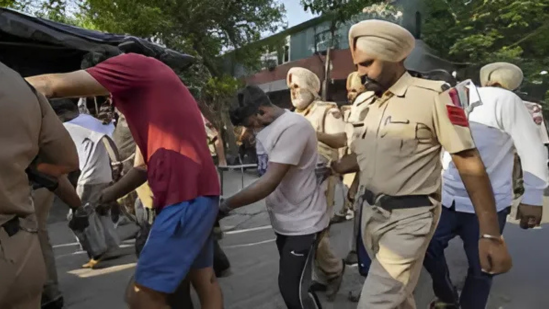
In a major security operation, the Punjab Police has arrested a suspected spy from Jalandhar for leaking sensitive military information to Pakistan’s Inter-Services Intelligence (ISI). The arrest was made during a special counter-espionage mission called Operation Sindoor, which aims to stop foreign spying networks operating within India. This arrest has raised serious concerns about national security and the ongoing attempts by Pakistan’s ISI to collect classified details from within Indian borders.
The man arrested has been identified as Sukhwinder Singh, a resident of Jalandhar district in Punjab. He had been under surveillance for several weeks after intelligence agencies noticed suspicious communications with unknown foreign contacts. After closely monitoring his actions, the police caught him red-handed with secret documents, mobile phones, and pen drives that reportedly contained army-related information, such as troop movements, training activities, and border post details. According to officials, he was in regular contact with ISI handlers using social media apps and encrypted messaging services.
The arrest was the result of a joint operation between the Punjab Police Intelligence Wing and the Special Operations Group (SOG). Acting on a tip-off, officers raided Singh’s home and seized devices and documents that proved he was involved in spying. A technical investigation revealed that he shared photographs, maps, and written data about military activities with Pakistani contacts. Authorities believe that this information could have caused serious harm to India’s defense systems if it had reached enemy hands.
Investigations suggest that Sukhwinder Singh was motivated by money. He allegedly received regular payments through digital wallets, and some money may have also come through hawala transactions. It is suspected that the ISI exploited his poor financial condition and lured him with promises of more money and even relocation to another country in exchange for sensitive data.
The Director General of Police (DGP) Punjab, Gaurav Yadav, confirmed the arrest and appreciated the teamwork of intelligence agencies. In a public statement, he said that this arrest was a major success in protecting the nation from foreign threats. He also warned that Pakistan’s ISI continues to target Indian citizens, especially in border states like Punjab, through fake social media accounts and online traps. He urged people to remain alert and report anything unusual to the authorities.
Legal action has already begun. Sukhwinder Singh has been booked under the Official Secrets Act, 1923, and also under sections of the Indian Penal Code (IPC) that deal with spying, sedition, and unauthorized sharing of government secrets. He has been taken into police custody for further questioning. Investigators are trying to find out if he was working alone or if he is part of a bigger spy network. There is also a possibility that more people in Punjab or nearby states are involved in similar activities.
This case highlights why Punjab continues to be a high-risk area for espionage activities. Due to its strategic location near the India-Pakistan border, ISI agents are especially interested in gathering military intelligence from this region. Over the years, ISI has tried to take advantage of religious sentiments, economic struggles, and political tensions in Punjab to recruit informants and disrupt internal peace.
India has seen several such espionage cases in recent years. For example, in 2020, a BSF jawan from Rajasthan was arrested for leaking information to a Pakistani woman. In 2021, an army clerk from Jodhpur was found guilty of selling army secrets. In 2023, authorities in Gujarat busted a spy ring that used civilians as middlemen to transfer information. These cases prove that ISI has a long-standing goal of weakening India’s defense through secret agents and moles.
Following the recent arrest, Indian intelligence agencies like the Research and Analysis Wing (RAW) and the Intelligence Bureau (IB) have increased surveillance across all border states. The focus is now on tracking sleeper cells, monitoring suspicious financial transactions, and improving cyber security systems. Military officials have also released fresh guidelines for soldiers and staff to avoid sharing any work-related information online, especially on social media platforms.
The public has been urged to support the police and intelligence agencies. People living in sensitive areas are being asked to watch out for strangers, unusual behavior, and social media messages from unknown sources. If anything looks suspicious, it should be reported immediately to the nearest police station. This collective awareness is necessary because the fight against spying is not only the job of the government—it is a shared responsibility of all citizens.
The arrest of Sukhwinder Singh has also led to political responses. While the Punjab state government has praised the police for acting swiftly, opposition parties have raised concerns over national security lapses. They are demanding better coordination between central and state agencies to stop such threats in the future. National security experts are calling for more investments in high-tech surveillance systems and intelligence training for state police forces.
This incident is a wake-up call for India. It proves that foreign threats still exist, and enemy countries like Pakistan are always looking for ways to harm India through secret operations. The arrest made by the Punjab Police shows the importance of intelligence sharing, public awareness, and cyber vigilance in today’s time. Every Indian must play a role in protecting the country by being alert and responsible. With timely action, cooperation, and strict laws, India can successfully defeat the evil plans of foreign spy agencies.































